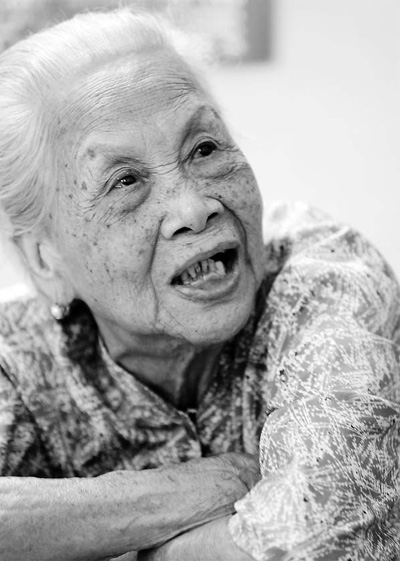Prime
Tending to the heads of state
Updated: 2011-05-24 07:56
By Li Wenfang (China Daily)
|
Ouyang Huanyan, 94, from Shunde, Guangdong province, recalls her more than 40 years of life working as a domestic helper for Singapore's most prominent family - the Lee family - that has given birth to two of the country's prime ministers. Picture taken on May 10, 2011. Zou Zhongpin / China Daily |
Sworn to singlehood, woman from Guangdong served Singapore leaders
SHUNDE, Guangdong - As a nanny and domestic helper for five decades, Ouyang Huanyan has cleaned up after some pretty big hitters.
Lying in a wooden chair and watching a soap opera in her South China village is a far cry from her days in Singapore taking care of the prime minister's children.
"The work was not too hard and we were like part of the same family," she said, displaying photos taken with the family of former prime minister Lee Kuan Yew, the founding father of Singapore.
Then an 18-year-old girl, Ouyang left her home in Xixi village in Guangdong province and boarded a boat in 1934 to follow her aunts and sisters overseas.
She first spent nine years as a domestic helper for Tan Kah-kee (1874-1961), a prominent businessman, overseas Chinese leader and philanthropist in Singapore.
"My family was poor," she said. With her father deceased, her mother had to feed three sons and three daughters.
"When our ship arrived in Singapore, I felt alienated. The dock was shabby, not as I had desired," she recalled.
As time went by, Ouyang got accustomed to life there.
Later she started working for the Lee family, where she would remain for 40 years, helping with the children and cleaning around the home.
As prime minister, Lee Kuan Yew would oversee the separation of Singapore from Malaysia in 1965 and become its first leader.
In the meantime, Ouyang was overseeing his children, especially his daughter, Lee Wei Ling.
She also remembers watching his son, Lee Hsien Loong, grow from a baby to a young man heading off to pursue studies overseas.
He has followed his father's footsteps and is now Singapore's prime minister.
Enjoying her independent life in Singapore, Ouyang became a zishunu in her 40s.
Literally translated as "tying up their own hair", zishunu were women who took a ceremonial vow to remain single.
In the Pearl River Delta during the later Qing Dynasty (1644-1911), when the silkworm-farming industry was booming, many women became more economically independent and favored the freedom outside the binding of feudal marriages, and so became zishunu.
The practice began to decline after the 1911 Revolution and the founding of the People's Republic of China in 1949. Ouyang is one of the few dozen zishunu still alive.
She was once chased by men but would not meet them. "I was devoted to my work. I had no heart for it. So why would I meet them?"
She returned to the mainland with her elder sister in 1986 and decided to stay to take care of her sister after she fell ill, despite repeated invitations from the Lee family to go back.
She gets up at 6 am, buys vegetables and meat and offers incense to ancestors and gods every day. Three nephews and a domestic helper assist her.
She enjoys watching TV, especially drama series with ancient themes, and playing mahjong with fellow villagers - including other zishunu.
It took more than three years for Ouyang to get used to life on the mainland after she returned. She tells stories about her life and the lifestyle in the city state to her nephews.
"My friends in Singapore asked me to visit them but I am not going, not at my age," she said.
Zheng Erqi contributed to this story.
China Daily
(China Daily 05/24/2011 page2)
Specials

Suzhou: Heaven on Earth
Time-tested adages sing praises of Suzhou, and Michael Paul Franklin finds it's not hard to understand why on a recent visit.

The sky's the limit
Chinese airline companies are increasingly recruiting pilots and flight attendants as the industry experiences rapid expansion.

Diving into history
China's richest cultural heritage may lie in the deep, like exhibits in a giant underwater museum.
